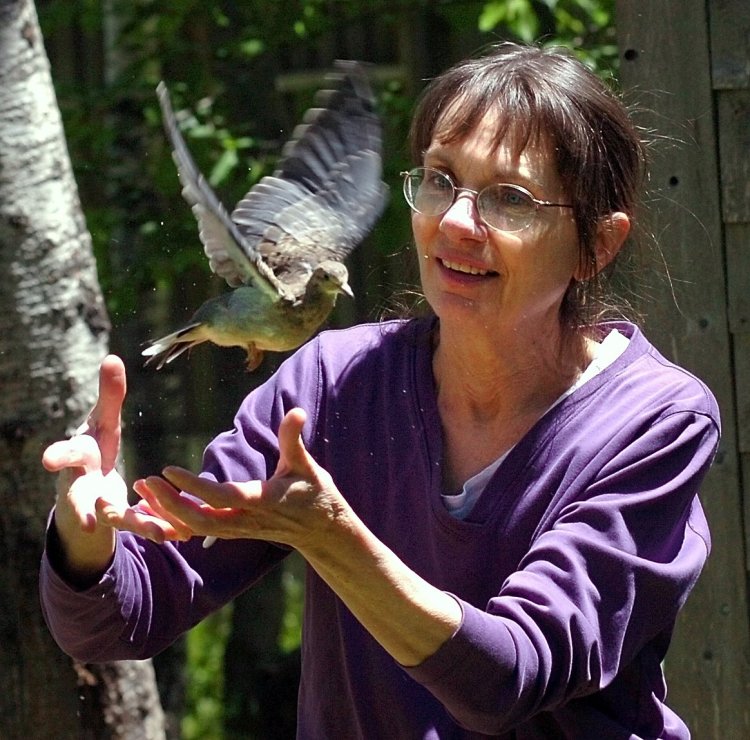Building on the momentum from Earth Day, celebrated last Monday, we should think about the direct and indirect ways that human activities imperil birds. Window collisions, car collisions and predation by pet cats that are allowed to go outside exact a significant toll on our birds. Birds may ingest lead weights and jigs lost by anglers or lead pellets from shot gun shells. The list goes on.
Collisions, cat attacks and lead ingestion may injure rather than kill birds. Bird rehabilitation centers offer such injured birds a fighting chance. Bird rehabbers are heroes.
In this column, I want to highlight the good work of Avian Haven in Freedom, Maine, as an example of the positive impact of bird rehabbers. We have a handful of other rehab clinics in the state, but I’m concentrating on Avian Haven because I have first-hand experience with that facility.
Avian Haven was established in 1999 by my friends Diane Winn and Marc Payne. Diane was a colleague of mine at Colby College where she was a professor of psychology. After her retirement, she and Marc dedicated their time and energy to bird rehabilitation. I think Diane is busier now than when she was a Colby professor!
Avian Haven made national news in January. The Great Black Hawk that spent a portion of the winter in Deering Park in Portland suffered severe frostbite in January. The bird was captured and taken to Avian Haven. Despite their best efforts, the tropical hawk could not be saved.
However, Avian Haven has many success stories to tell. In 2018, 2,900 birds were admitted to the clinic. Since they opened, Avian Haven has treated more than 26,000 birds. Many of these had suffered either collisions or cat bites. Some, of course, succumbed to their wounds. Cat bites are particularly insidious because of the bacterial infections that often result if a bird’s skin is punctured. Antibiotics must be administered soon after a cat bite.
Keeping cats indoors is obviously the most effective way to reduce predation on birds. However, an effective way to allow your cat to be outside but reduce the threat to birds is to fit your cat with a stylish cat bib, which are easy to find on the web. The bib prevents a cat from pouncing.
Summer is a busy time for Avian Haven. About 38% of the birds taken in are orphan birds that must be hand-fed until they fledge.
In 2018, 130 species were handled by Avian Haven. The most common was Herring Gull – with 216 cases – followed by American Robin, Mourning Dove, Eastern Phoebe, Barred Owl and American Crow.
Avian Haven continues to grow. The nonprofit now has 15 buildings that house birds on the mend. One building is big enough to allow Bald Eagles and other raptors to fly. Other buildings are equipped with pools to make diving birds feel right at home.
Some birds that enter the clinic can be saved, but their injuries prevent them from being released into the wild. Those birds may be put to work as foster parents, eagerly adopting chicks that are brought into the clinic. These birds include a Mallard and a Rock Pigeon, named Mr. Pumper because of his enthusiastic feeding of chicks.
Avian Haven is a working facility so it does not allow tours. Avian Haven, in other words, is for the public but not open to the public. Diane and Marc are joined on the staff by a rehabilitation manager, a physical plant manager and a staff veterinarian, along with many dedicated volunteers and interns. The organization also has a pool of 200 volunteer drivers who traverse the state, bringing injured birds to Avian Haven. These drivers often work in relays, pony-express style, to get an injured bird to Avian Haven. Don Fournier led the way by delivering 788 birds, driving almost 34,000 miles. Check out this great facility out at www.avianhaven.org and learn how you can help.
Herb Wilson teaches ornithology and other biology courses at Colby College. He welcomes reader comments and questions at whwilson@colby.edu.
Send questions/comments to the editors.



Comments are no longer available on this story